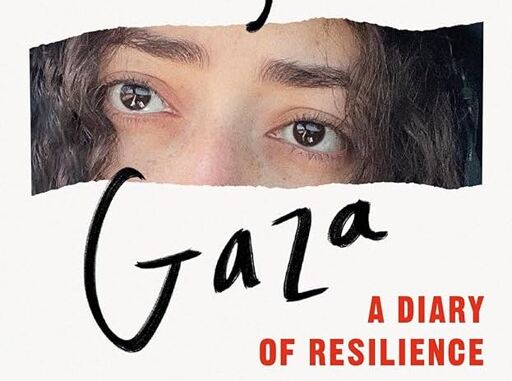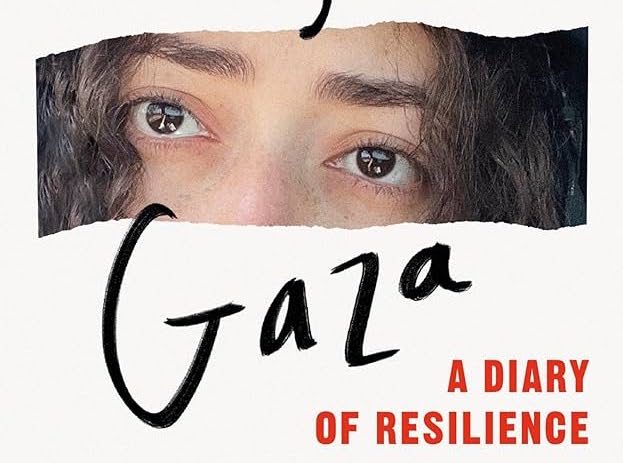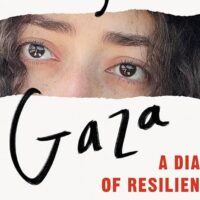Cover art for the book The Eyes of Gaza by Plestia Alaqad – Fair Use
There’s a scene in Plestia Alaqad’s new book The Eyes of Gaza: A Diary of Resilience where she describes buying craft materials for two young girls in Gaza who have been making bracelets for their friends and others. The girls don’t just make bracelets though, they make ID bracelets so that if and or when the recipients of the bracelets are killed by the Israeli military, they can be identified. This vignette is an apt and all too tragic description of life for Palestinians, especially in Gaza. It is also just one of many such episodes in Alaqad’s disturbing journal of life in the imperial hell that Gaza has become as Israeli drones and planes drop US bombs on people who dared stand up against the perpetrators’ decades long occupation and repression.
Alaqad is a journalist whose life before October 7, 2023 was, while not charmed in the US sense of the word, was certainly materially better than many of her fellow Palestinians. A recent graduate of the Eastern Mediterranean University in northern Cyprus and working as in human resources for a marketing firm at the time, she was also developing an online presence as a freelancer where she wrote about her travels. Her social media presence was growing slowly. However, when she began documenting the ever-mounting death and destruction perpetrated by the Israeli military in the wake of the October 2, 2023 attacks by the Palestinian resistance, her following jumped to over two million within weeks. Leaving the military and logistical descriptions to other journalists, Alaqad’s coverage focused on individuals and families and their response to what she first calls the latest aggression but soon renames the murderous catastrophe as a genocide. In her discussions of the terminology, the reader becomes acutely aware of the essentially permanent nature of Israel’s brutality against those who land it occupies. Likewise, one is reminded that the Palestinian ability to endure and resist their oppressor is a prime example of the human spirit, as much as the murderous brutality of the Israeli military remains a prime example of humanity’s ability to inflict pain and death on other humans.
I’m not going to pretend this is an easy or delightful text to read. Despite the well-crafted prose and heartfelt intensity of the stories and human portraits within, this book is, too say the least, emotionally wrenching. Indeed, tears came to my eyes while reading it. Regarding this element, let me state that it is Alaqad’s ability with language that makes those emotions so real. One is not just allowed to become emotionally involved, one is forced to. To state this more precisely, let me say that when I first opened this book, my intention was to review it together with a couple other books about the genocide in Gaza. However, by the time I was done, the author’s writing had convinced me it needed a review dedicated to this text alone.
As the title suggests, Alaqad writes about the Palestinian experience not from a point of victimhood. Indeed, like the title of Mohammed El-Kurd’s May 2025 book Perfect Victims: And the Politics of Appeal, Alaqad addresses this. The “ongoing tragedy,” she writes “has conditioned people to believe that our primary role is to be those who suffer and die at the hands of Israel.” (115) It is this truth, she continues, that has dehumanized the Palestinians in the eyes of the world. They are not completely human because they only suffer and die. In a manner somewhat similar to El-Kurd (and is finally becoming obvious to those who used to pretend otherwise), it is their resistance and their resilience that proves the falsity of the characterization quoted above.
There’s a book by China Mieville titled The City and the City that attempts to represent the nature of the Israeli occupation that divides the West Bank into two separate entities existing next to and on top of the same territory. One entity is for the occupier and the other is for the occupied. Reading The Eyes of Gaza: A Diary of Resilience in September 2025 is similar except it is time that is being bent—like being in two places at once, two time periods simultaneously. Alaqad left Gaza in 2023 to stay with a relative in Australia. The Eyes of Gaza is a journal of a genocide written previously and being read currently while that genocide continues in a manner even more heartless and grotesque than the time being read about. It’s a testimony of hearts being broken by a heartless and soulless entity supported by other equally heartless and soulless governments and the financial institutions they serve. At the same time, it is a story of a people whose very lives are an act of resistance.
The post A Disturbing Journal of an Imperial Hell appeared first on CounterPunch.org.
From CounterPunch.org via this RSS feed




